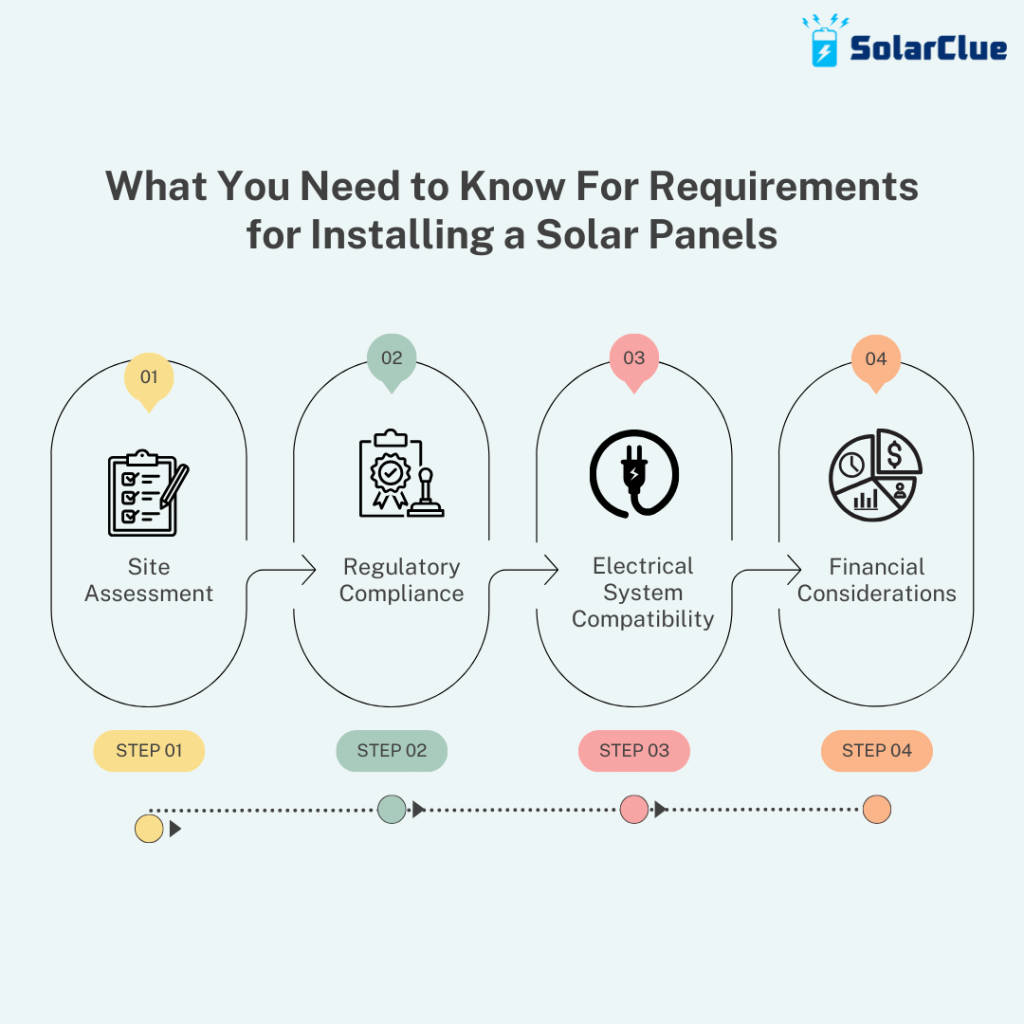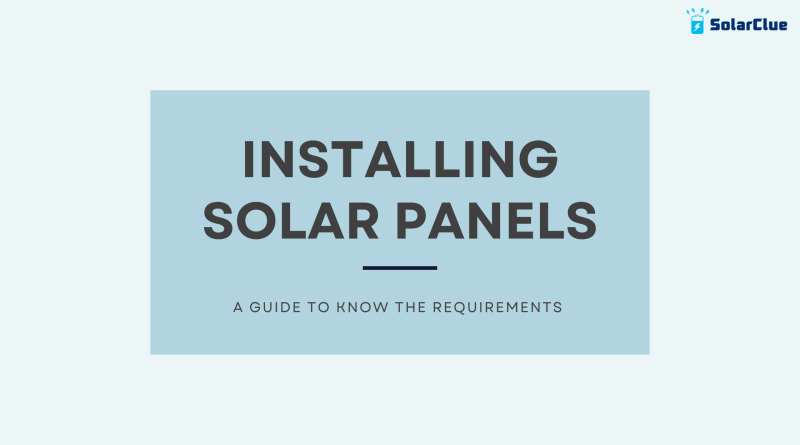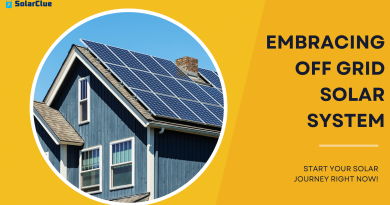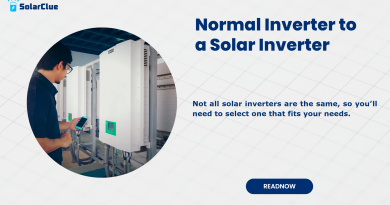Key Requirements for Installing a Solar Panel
With the growing concern for the environment and the increasing popularity of renewable energy sources, solar power has taken center stage. Furthermore, solar panels have emerged as a key technology for harnessing the sun’s energy and converting it into usable electricity. If you are considering installing solar panels, there are two fundamental requirements that must be met: suitable roof space and a reliable solar power system. In this blog, we will explore the solar installation requirements of two essential components in detail. Lets look into the detail of Requirement for Installing Solar Panel.
Table of Contents
Solar Panel Installation Requirement: Suitable Roof Space
Firstly, the major thing is Solar Panel Installation Requirement is Suitable Roof Space. To harness the sun’s energy effectively, solar panels require a suitable roof space. Here are two crucial factors to consider when assessing the suitability of your roof for solar panel installation:
1. Orientation and Tilt:
One of the requirement for installing Solar Panel is the orientation and tilt of your roof play a significant role in maximizing the efficiency of your solar panels. Ideally, your roof should have a south-facing orientation to receive the maximum sunlight throughout the day. Additionally, this optimal positioning ensures that your solar panels can harness sunlight effectively, enhancing their overall performance.
However, panels installed on east or west-facing roofs can still generate a substantial amount of energy. The optimal tilt angle of solar panels varies depending on your location. Consulting with a solar professional can help determine the most favorable tilt angle for your specific location, ensuring maximum energy production.
2. Shade and Obstructions:
One more requirement for installing Solar Panel is Shade on your roof can greatly reduce the performance of solar panels, as even a small amount of shade can disrupt the flow of electricity. Therefore, it is crucial to assess the amount of shade your roof receives throughout the day. Analyze potential obstructions such as nearby trees, neighboring buildings, or even chimneys. If shade is a concern, consider trimming trees or removing obstructions to ensure your solar panels receive unobstructed sunlight for optimal energy production.

Solar Panel Installation Requirement : Reliable Solar Power System
Secondly, the major thing is Solar Panel Installation Requirement is Reliable Solar Power System. In addition to suitable roof space, a reliable solar power system is essential for successful installation. Here are two key elements to consider when planning for a solar power system:
1. Solar Panels:
Choosing the right solar panels is crucial for a reliable and efficient system. There are primarily two types of solar panels available: monocrystalline and polycrystalline. Monocrystalline panels are typically more costly but offer higher efficiency and better performance in low-light conditions. Polycrystalline panels, on the other hand, are more affordable but have slightly lower efficiency. Your choice ultimately depends on your budget and specific requirements. Additionally, make sure to select panels from reputable manufacturers to ensure durability and long-term performance.
2. Inverter:
An inverter is a critical component of any solar power system as it converts the DC (direct current) electricity generated by the solar panels into AC (alternating current) electricity suitable for use in your home or to be fed back into the grid. Additionally, Selecting the right inverter is essential for the overall efficiency of your system. There are three main types of inverters available: string inverters, microinverters, and power optimizers.
Firstly, String inverters are the most common and cost-effective, but microinverters and power optimizers offer advantages in systems with partial shading or complex roof layouts. Evaluating your system requirements and discussing with a solar professional will help you determine the most suitable inverter for your installation.
Conclusion
Embarking on the journey to install solar panels requires a thoughtful approach, focusing on two crucial elements of Solar Panel Installation Requirement: a suitable roof space and a reliable solar power system. Firstly, Ensure your roof has the correct orientation, minimal shade, and unobstructed access to sunlight, maximizing energy production from your panels. The choice of solar panels and inverters significantly influences the overall efficiency of your system.
Collaborate with solar professionals during the planning and installation stages to leverage their expertise, enabling well-informed decisions and optimizing the advantages of solar energy for your home or business. By embracing solar power, not only do you reduce reliance on conventional energy sources, but you also play a part in creating a cleaner and greener future. Take the first step toward sustainable energy with SolarClue® – your trusted partner in solar solutions.
Frequently Asked Questions
The optimal positioning of solar panels involves placing them on south-facing rooftops to maximize sun exposure. Additionally, avoiding obstructions such as trees and tall buildings is crucial for ensuring unobstructed access to sunlight.
Look for reputable brands with proven performance in the specific climate, ensuring resistance to heat and humidity. Furthermore, quality panels are designed for longevity and optimal efficiency, providing a reliable and durable solution for your solar energy needs.
The inverter plays a vital role in converting sunlight into usable electricity. Moreover, high-efficiency inverters maximize energy conversion, thereby contributing significantly to the overall effectiveness of the solar installation.
Navigating local regulations and obtaining necessary permits is crucial for a smooth installation process. This ensures compliance with legal requirements and helps avoid potential complications that might arise during the solar panel installation.
Regular maintenance, including cleaning and inspection, is necessary for optimal performance. Prompt resolution of minor issues can significantly extend the lifespan of the solar installation.
Solar panels contribute to a significant reduction in carbon emissions, making them an eco-friendly choice. Additionally, harnessing energy from the sun positively impacts the environment, further emphasizing the sustainable benefits of solar power.
Yes, various government incentives, such as tax credits and rebates, aim to make solar power more accessible and cost-effective for homeowners. Additionally, these initiatives provide financial support and encourage individuals to embrace solar energy solutions for their homes.
Yes, solar panels can be applied in commercial spaces, offering businesses cost savings and contributing to sustainability goals.
Emerging technologies in the solar industry suggest potential improvements and innovations that may shape the future of solar installations. To stay informed, make sure to stay updated on advancements in the field, keeping abreast of the latest developments in solar technology.
To ensure compliance, research and understand local regulations governing solar installations. Additionally, seek professional guidance to navigate the permit process, ensuring a smooth and legally compliant solar panel installation.



